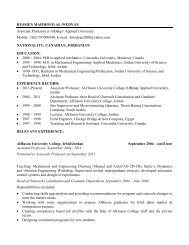Abstract Book - 3rd International Symposium on Medicinal Plants ...
Abstract Book - 3rd International Symposium on Medicinal Plants ...
Abstract Book - 3rd International Symposium on Medicinal Plants ...
Create successful ePaper yourself
Turn your PDF publications into a flip-book with our unique Google optimized e-Paper software.
<str<strong>on</strong>g>Abstract</str<strong>on</strong>g>: Field experiments were c<strong>on</strong>ducted during two successive seas<strong>on</strong>s of 2009/2010 and<br />
2010/2011 at a private farm in South Ghor area, Al-Karak, Jordan, to study the effect of humic acid<br />
foliar spray with three c<strong>on</strong>centrati<strong>on</strong>s 0,0,100, and 200 mg/liter and three levels of nitrogen<br />
fertilizer, i.e. 0, 45,and 90 kg/ha pure nitrogen <strong>on</strong> urea form <strong>on</strong> Thyme (Thymus vulgaris L.)<br />
growth and productivity. Results showed plant height, herbage yield and oil (%) were influenced by<br />
foliar spraying of humic acid and with nitrogen fertilizer applicati<strong>on</strong> and their interacti<strong>on</strong> effects.<br />
Foliar spraying of humic acid at 100 and 200 mg/liter and nitrogen applicati<strong>on</strong> at both doses (45<br />
and 90 kg/ha) resulted in more vigorous plants and significantly increased herbage yield, plant<br />
height and essential oil (%) compared to their respective c<strong>on</strong>trol. More growth and yield were<br />
associated with higher humic acid and nitrogen fertilizer treatments. Foliar humic acid applicati<strong>on</strong><br />
at 100 and 200 mg/liter combined with nitrogen fertilizer applicati<strong>on</strong> (45and 90 kg/ha) led to<br />
maximize the growth and essential oil (%), although n<strong>on</strong>-significant in most cases.<br />
Key words: Thyme( Thymus vulgaris L.), growth, humic acid, nitrogen fertilizati<strong>on</strong>.<br />
4.24 Effect of Magnetic Field <strong>on</strong> Cardo<strong>on</strong> (Cynara cardunculus l.) Seedlings<br />
SHARAF-ELDIN Mahmoud 1,2 , ALGORASHY Assari 1 , SABRY Refaat 3,4 , and<br />
ELSAYED Ibrahim 3<br />
1 Sara bint Rached bin Gh<strong>on</strong>aim research chair for cultivating n<strong>on</strong>-traditi<strong>on</strong>al medicinal and<br />
aromatic plants, College of Sciences and Humanitarian Studies, Salman bin Abdulaziz University<br />
(SAU), P.O. Box 83, 11942 Alkharj, Kingdom of Saudi Arabia (KSA). 2 Department of <strong>Medicinal</strong> and<br />
Aromatic <strong>Plants</strong> Research, Nati<strong>on</strong>al Research Centre (NRC). 12622-Cairo, Egypt. 3 Salman bin<br />
Abdulaziz University (SAU), College of Sciences and Humanitarian Studies, Physics Department.<br />
PB 83, 11942 Alkharj, Saudi Arabia. 4 <str<strong>on</strong>g>Internati<strong>on</strong>al</str<strong>on</strong>g> Centre for Advanced Studies in Physical<br />
Sciences, Faculty of Physics & Astr<strong>on</strong>omy, Ruhr University Bochum, D-44780 Bochum, Germany.<br />
<str<strong>on</strong>g>Abstract</str<strong>on</strong>g>: Applicati<strong>on</strong> of electricity, magnetism, m<strong>on</strong>ochrome light, and sound can stimulate the<br />
growth of plants to a great extent. This little-known technology, called Electro-culture, can<br />
accelerate growth rates, increase yields, and improve crop quality. Electro-culture can protect<br />
plants from diseases, insects and frost. These methods also can reduce the requirements for<br />
fertilizer or pesticides. Growers can produce greater and better crops in less time, with less effort,<br />
and at a lower cost. The energies are applied to the seeds, plants, soil or the water and nutrients.<br />
Cardo<strong>on</strong> plant (Cynara cardunculus L.) would be <strong>on</strong>e of the best plants suits for the reclaimed<br />
desert lands in the Kingdom of Saudi Arabia (KSA). Last year in the market the price of the fresh<br />
artichoke head was SAR 5.53/0.37g and for processed artichoke receptacle was SAR 11.50/400g.<br />
Here we report for the first time the cultivati<strong>on</strong> of cardo<strong>on</strong> in the KSA in particular at Alkharj<br />
Governorate. A laboratory experiment was carried out during the successive seas<strong>on</strong> of 2011/2012<br />
at the premises of the Sara bint Rached bin Gh<strong>on</strong>aim Research Chair for Cultivating n<strong>on</strong>-<br />
Traditi<strong>on</strong>al <strong>Medicinal</strong> and Aromatic plants, SAU, KSA, to study the effect of magnetic field (MF) <strong>on</strong><br />
cardo<strong>on</strong> (Cynara cardunculus L.) seedlings. Seeds of Cynara cardunculus L. (Compositae) of<br />
German origin were supplied by Jelitto GmbH, Germany. Seventy five mT MF was used as<br />
follows: three different MF exposure time were studied as MF1: 15 min., MF2: 30 min. or MF3: 45<br />
min, and MF0: not exposed to MF (c<strong>on</strong>trol) were studied. We found that magnetic fields (MF) had<br />
significant effects <strong>on</strong> most of agr<strong>on</strong>omic parameters studied. Days to germinate, germinati<strong>on</strong><br />
percentage, seedling length (cm), root length (cm), seedling fresh and dry weight (g) influenced<br />
with the increase in MF exposure time. Am<strong>on</strong>g various MF exposures time (MF2) exhibited the<br />
best growth attributes. Additi<strong>on</strong>ally, root system was influenced by MF exposure.<br />
Key words: Cardo<strong>on</strong>, Cynara cardunculus, magnetic field.<br />
107

















